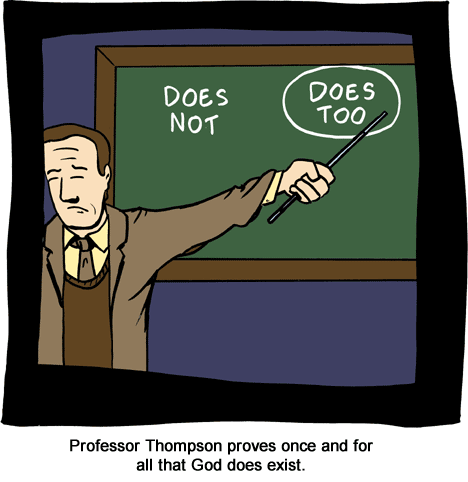- Joined
- Jul 13, 2007
- Messages
- 336
- Reaction score
- 2
Two more points to tack on here:
Re: religion and scientists: I heard a talk that discussed this issue. It seems that religiosity tends to decrease as a person's educational attainment increases and as their field gets "harder" (not as in "more difficult," but as "hard science": physics being harder than biology, which is harder than psych, which is harder than sociology). Something like 90% of the general population is religious, but only 7% of members of the National Academy of Sciences profess any religious belief. Alas, I don't have the cites handy and can't find an excerpt on YouTube, even though other parts of the same talk are pretty easy to find.
Re: proving the origin of the universe:
The argument seems to be coming down to "religion has an explanation and science doesn't, so religion must be right." That's not correct, however. Just because we haven't yet come to a solid conclusion via the scientific method does mean that we cannot or will not come to a conclusion. Everything that we have discovered through science was once unknown.* It also doesn't mean that we can give any credibility to explanations from other sources simply because those explanations have been proffered.
* And in some cases, these things we have learned have directly contradicted the Bible. For example, we know that rainbows are light split by water droplets in the air acting as prizms. The Bible explains rainbows as God's promise not to douse the planet again. Of course, there's nothing to say that god didn't alter the physics of light and/or water to allow the rainbows to form as a symbol of his commitment, but we do have an explanation that doesn't require God.
Re: religion and scientists: I heard a talk that discussed this issue. It seems that religiosity tends to decrease as a person's educational attainment increases and as their field gets "harder" (not as in "more difficult," but as "hard science": physics being harder than biology, which is harder than psych, which is harder than sociology). Something like 90% of the general population is religious, but only 7% of members of the National Academy of Sciences profess any religious belief. Alas, I don't have the cites handy and can't find an excerpt on YouTube, even though other parts of the same talk are pretty easy to find.
Re: proving the origin of the universe:
The argument seems to be coming down to "religion has an explanation and science doesn't, so religion must be right." That's not correct, however. Just because we haven't yet come to a solid conclusion via the scientific method does mean that we cannot or will not come to a conclusion. Everything that we have discovered through science was once unknown.* It also doesn't mean that we can give any credibility to explanations from other sources simply because those explanations have been proffered.
* And in some cases, these things we have learned have directly contradicted the Bible. For example, we know that rainbows are light split by water droplets in the air acting as prizms. The Bible explains rainbows as God's promise not to douse the planet again. Of course, there's nothing to say that god didn't alter the physics of light and/or water to allow the rainbows to form as a symbol of his commitment, but we do have an explanation that doesn't require God.

